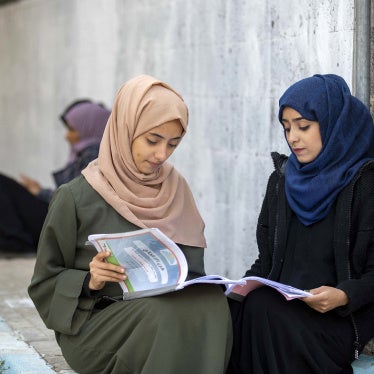(Beirut) ─ Tunisia’s lifting of key reservations to the Convention on the Elimination of All Forms of Discrimination against Women (CEDAW) is an important step toward gender equality, Human Rights Watch said today. The Tunisian government should next ensure that all domestic laws conform to international standards and eliminate all forms of discrimination against women, Human Rights Watch said.
Tunisiais the first country in the region to withdraw all of its specific reservations to the treaty. These reservations had enabled it to opt out of certain provisions even though it had ratified the treaty.
The Tunisian Council of Ministers adopted a draft decree on August 16, 2011, to lift the reservations. “Many of the reservations limited women’s equality within their families, and their removal finally recognizes that women are equal partners in marriage and in making decisions about their children,” said Nadya Khalife, Middle East women’s rights researcher at Human Rights Watch. “The Tunisian government, by lifting major reservations to CEDAW, is proclaiming its commitment to advance women’s rights.”
The August 16 decree lifts all reservations except a general declaration that Tunisia“shall not take any organizational or legislative decision in conformity with the requirements of this Convention where such a decision would conflict with the provisions of Chapter I of the Tunisian Constitution.” Chapter I establishes Islam as the state religion. This declaration should also be removed, as no state should use its own constitution as an excuse for not complying with international standards, Human Rights Watch said. But Tunisia has not used the declaration to attempt to justify maintaining laws or practices that violate CEDAW, Human Rights Watch said.
The convention was adopted in 1979 by the United Nations General Assembly. It defines what constitutes discrimination against women and establishes an action plan for nations to use to end such discrimination. Some states parties have entered reservations to the treaty, to keep from having to apply certain provisions.
The Tunisian reservations concerned treaty requirements to provide equality to women in family matters. These include passing on their nationality to their children, rights and responsibilities in marriage and divorce, matters relating to children and guardianship, personal rights for husbands and wives with regard to family name and occupation, and ownership of property. CEDAW provides for full equality for women in all these matters.
Although Tunisia has one of the most progressive personal status codes in the region, the code still contains discriminatory provisions. Women are denied an equal share of an inheritance, for example. Brothers, and sometimes other male family members, such as cousins, are legally entitled to a greater share. Article 58 of the personal status code gives judges the discretion to grant custody to either the mother or the father based on the best interests of the child, but prohibits allowing a mother to have her children live with her if she has remarried. No such restriction applies to fathers.
“While lifting of these reservations to CEDAW sets the stage for equality for Tunisia’s women, there is still much that must be done to remove discriminatory provisions against women in the personal status code,” Khalife said. “Once an elected new legislature is in place, it should make the review and amendment of discriminatory legal provisions against women one of its top priorities.”
Tunisia is the first country in the region to lift all specific reservations to CEDAW. Tunisia is also one of only two countries in the Middle East/North Africa region to adopt the Optional Protocol to CEDAW, which entitles individuals or groups of individuals to submit complaints on women’s rights violations to the CEDAW Committee.
However, Tunisia is one of only four members of the African Union that have refused to sign, let alone ratify, the Protocol to the African Charter on Human and People’s Rights on the Rights of Women in Africa (Maputo Protocol). Tunisia made reservations to some of the Charter’s clauses related to marriage.
“Tunisia has proven itself a leader on women’s rights in the region, and we hope it will set an example to other countries as the calls for reform sweep the Middle East and North Africa, Khalife said. “To ensure that it continues this leadership on gender equality, Tunisia should also sign and ratify the Maputo Protocol.”








